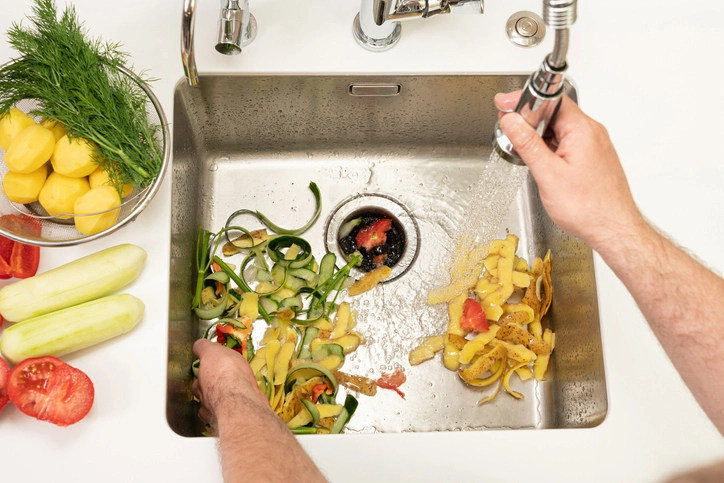
5 Reasons Your Garage Disposal Smells and Ways to Resolve It
Garbage disposals are one of the most convenient appliances we have in our kitchens. They help us eliminate food waste easily, making kitchen clean-up a breeze. However, when your disposal emits an unpleasant odor, it can quickly ruin your kitchen experience. What causes a smelly garbage disposal, and what can you do to fix it?
The team at Mr. Rooter Plumbing Wilmington and Brunswick County dives into the different reasons why your garbage disposal smells bad and how you can eliminate the unpleasant odor.
5 Reasons Your Garage Disposal Likely Smells
1. Waste Buildup
One of the most common causes of smelly garbage disposal is food or waste buildup. Food waste may accumulate around the blades or in the drainpipe, leading to bacteria and mold growth, which emit an unpleasant odor.
The Fix: To remedy this problem, you can run cold water and grind ice cubes and citrus peels in your garbage disposal. As a result, you can help get rid of any leftover food and the odor it emits. You can also use white vinegar or baking soda in the drain, letting it settle for a few minutes before rinsing with cold water.
2. Clogged Pipes
If your garbage disposal is operating smoothly, but water backs up into the sink and is accompanied by a bad smell, this could indicate a clogged drain. Clogs prevent water from flowing smoothly through your drains, causing bad smells to emerge.
The Fix: Unpleasant odors can be eliminated with boiling water to help break down the buildup so it can move down the drain. Alternatively, you can use a plunger or a cleaning snake to remove any clogs. Remember to avoid pouring harsh chemicals down your drain, as they may cause more damage to your pipes.
3. Mold or Bacteria Growth
Your garbage disposal can unwittingly become a breeding ground for mold and bacteria due to its damp and dark environment. These microorganisms thrive in moist settings, and the combination of food waste and water provides a perfect habitat for them.
When food particles are not entirely ground up or flushed out, they can stick to the walls of the disposal or drains. Over time, this buildup of food debris creates an organic matter layer. This layer, coupled with the moisture inside the disposal, forms an ideal condition for mold and bacteria to proliferate.
As these microorganisms grow, they start to decompose, trapping food particles. This decomposition process produces foul-smelling gases, which can emanate from your garbage disposal, causing unpleasant odors in your kitchen.
The Fix: To tackle this, pour a solution of white vinegar and baking soda down the drain, let it sit for about 15 minutes, and then rinse with cold water. This natural mixture should kill bacteria and help reduce mold buildup.
Additionally, certain types of bacteria, such as E. coli and salmonella, can potentially pose health risks. Therefore, it's crucial to regularly clean and maintain your garbage disposal to prevent the growth of mold and bacteria.
4. Proper Grinding Techniques
Improper grinding techniques can indeed lead to smelly garbage disposal. When large chunks of food waste are fed into the disposal, they may not be fully ground up. The disposal blades, designed to handle smaller pieces, might not completely break down larger items. These partially ground food particles can then get stuck in the disposal or the drainpipe.
Over time, these trapped particles start to decompose, producing unpleasant odors. Moreover, certain types of food waste, such as fibrous materials (like celery or corn husks) or starchy foods (like potato peels), can be particularly troublesome. Fibrous materials can tangle around the disposal's blades, while starchy foods can create a sticky paste, leading to blockages and subsequent bad smells.
The Fix: By cutting food waste into smaller pieces before using the garbage disposal, you ensure that the waste is adequately broken down and flushed out of the system. This solution helps prevent food particles from becoming lodged in the disposal or pipes, minimizing the chance of developing odors. Regular garbage disposal cleaning and maintenance can also go a long way in keeping it odor-free.
Regular Maintenance Can Help Your Garbage Disposal
Regular garbage disposal maintenance is crucial to ensure this component runs smoothly. This means scheduling a professional drain cleaning service at least once a year to get rid of any buildup that may cause your disposal to emit a foul smell. In addition, avoid throwing oil, grease, and coffee grounds down your disposal as they can accumulate in your pipes and cause clogs.
Mr. Rooter Plumbing Wilmington and Brunswick County Is Ready to Assist You
A smelly garbage disposal is unpleasant and can also be dangerous for your health. Your garbage disposal may stink because of rotten food, clogged pipes, mold, or bacteria growth. Luckily, there are many ways to eliminate these odors. Practicing proper grinding techniques, using natural cleaning agents, and scheduling regular maintenance can help prevent smelly garbage disposal.
However, the best way to support your garbage disposal when it’s experiencing issues is to call Mr. Rooter Plumbing in Wilmington and Brunswick County. Our experienced plumbers can solve your issues quickly and efficiently, providing top-quality drain cleaning services.
Contact us today to learn more about our exceptional plumbing services to ensure your pipes are always running smoothly.

